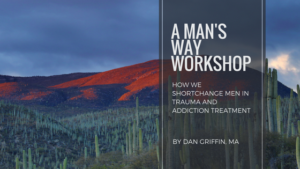When I went to school to learn how to work with people with addictive disorders I got a lot of great guidance—Brain science. Family systems. Motivational Interviewing. Models of Change. Working with the criminal justice population. Working with women. Cultural influences on addiction and recovery.
There was one population, though, for whom I didn’t really get any specific instruction or support—men. At the time, I didn’t think too much about it; But, eventually, I started thinking about men and how we are and are not served by current service delivery systems.
After 7 years of presenting and training people, I am far from the only counselor who never got any instruction. In fact, it’s rare for me to meet anyone who got specialized training on men. Women? You bet. That’s because, as we all know, women are a special population. Men, however, are not because everything is already about men. All the norms have been set based on men. All the systems have been designed by men. Or so I have been told for years now. Men are the default. Plus, we all know, that men are not that complicated.

Right?
To me the question is ridiculous, and the answer is obvious. Of course men are much more complicated than we give them credit for, and our failure to recognize that has negative impact on how men are treated in various systems of treatment.
I will never forget the person who came to a Griffin Recovery Enterprises training several years ago who had to come without their supervisor’s approval. They had to take vacation time to be at our training on men and trauma. Why? Because in their supervisor’s words: “Trauma is not a big issue for men.”
While my work has become increasingly more accepted and sought after, there is still an overwhelming amount of opportunity to educate and raise awareness about men and the impact of trauma. And, I am far from the only one out there saying we need to do more for men. There are wonderful clinicians and academicians all over the country challenging service providers and even systems.
However, even with all of those efforts the vast majority of people graduating with any degree related to treatment services—from bachelors to Ph.D—.are still not being given any formal training on working with men as a special population. Most people graduating with LCPs, MSWs, MFTs, and PsyDs were never challenged to look deeply at how male socialization significantly impacts a man’s ability to engage in therapy and in relationships in general.
It seems crazy given how large of a population of men go through treatment each year that we have never really taken a hard look at treatment services for men. Is this really what men need? Is this really what is best for men? Add to that other addictive disorders, mental health treatment, and various forms of therapy and men are a huge percentage of those taking advantage of services. Yet nobody seems to ask a very simple question: Have the services really been designed for men?
I will be delivering a keynote on March 21st at Torrance Memorial Hospital entitled: It’s Us, Not Them. The premise is simple yet profound: the problem engaging men in addiction and mental health treatment has much less to do with their ability or willingness to engage in services, and nearly everything to do with the services themselves.
We have spent years questioning, challenging, and even blaming men; but, we have not questioned, challenged, or even blamed the services themselves! The dominant belief still is that men don’t want help and are therapy-averse. I am far from convinced of that. I believe that if we don’t take a hard look at the services we provide and become aware of the biases driving them, we will never know what men respond to the best, or what kinds of transformations are really possible.
This past weekend I led my first A Man’s Way workshop for professionals at the Rio Retreat Center at The Meadows. It was an amazing experience. Nine people (6 men and 3 women), with anywhere from 3 to 30+ years of experience in therapeutic services, showed up without being really sure about what was going to happen. It was part experiential and part instructive.
What has become clear to me over the years is that our ideas about men deeply affect how well we are able to engage with men clinically and relationally. I have worked hard to develop models for helping people see the biases they had no idea they even had. I built the three-day, A Man’s Way workshop around those models. We look at The Man Rules™ and how those fairly obvious constructs run deep into the psyche of most boys and men and profoundly impact our experiences of trauma, sex and sexuality, relationships, and spirituality.
Inevitably we get to look at our own trauma and shame and how they have influenced how we work with and relate to men. It is powerful work. The greatest complement to our collective efforts is that we all talked about seeing clear opportunities to do more work and get additional therapy. Yes, me too!
If you are interested, I will be leading another A Man’s Way workshop for behavioral health professionals April 28-30. There are still some spots available. It is an honor to be able to work with The Meadows in developing this workshop who has created a really great deal—one third off the usual price— in an effort to show its support for this one-of-a-kind opportunity. You can’t find this program anywhere else in the country!
You can find out how to register HERE.

